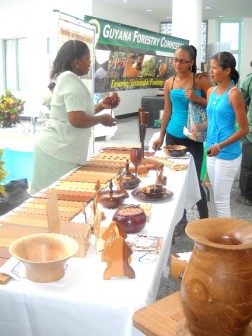Guyana led the way in developing the “economics of trees” and citizens must be proud of the collective achievements, President Bharrat Jagdeo has said but he warned of the consequences if forests are considered in isolation from climate policies.
“If we look at forests in isolation from climate policy then we’ll be making a serious mistake,” Jagdeo said in the feature address at a symposium to mark the Inter-national Year of Forests at the International Convention Centre at Liliendaal yesterday.
Jagdeo pointed out that some industrialised countries focus on forest preservation but their climate change policy is atrocious and would lead to the destruction of the world. He explained that these countries would allocate money for forests but they are unwilling to commit to a global agreement that seeks to cut carbon emissions, leading to a rise in greenhouse gases which scientists say will have catastrophic consequences. “You cannot say that I want to preserve forests and then you are pursuing policies that will lead to their eventual, total destruction,” he argued.

The United Nations has declared 2011 as the International Year of Forests with the aim of promoting sustainable management, conservation, and development of forests worldwide and Jagdeo noted yesterday the need for a balance. He said he is happy that Guyanese have a greater consciousness of this issue than most developed countries across the world and noted that it has been broad-based, leading to the awakening of the consciousness that the country has to preserve the forests because it offers a sustainable opportunity for Guyanese.
Jagdeo said he was happy that many people from the non-governmental organisations, the political directorate and from community organisations, helped to raise awareness of the Low Carbon Development Strategy and how Guyanese can benefit. He pointed out that Guyanese have always had the concept that the forests are important “environment-wise” and as a significant source of employment.
“But because of our work together, we’ve evolved this concept now from just this notional value to the country, often based on emotion, to a value based on assessing all the services that these forests provide and then, the work we have done in that has led the way in the economics of trees,” said Jagdeo. He added that because of this work, what has been written about in abstract ways by academics has been translated to a practical living model of how the economics of forests can work.
He noted the complaints about the work done by consultancy firm McKinsey and Co, saying that long before the firm came here, Guyana had offered to put its entire forest under long-term protection but no one internationally and locally would listen and some even labelled it a “crazy scheme.
“To give credibility to the model, we had to get a major consultancy firm to work with us to demonstrate the economics of our forests, to add a dollar and cents value to our trees and the foregone opportunities by keeping those trees standing just to make sure that the concept had an economic, a technical case which we did.” That was the extent of McKinsey’s work, he stressed.
Jagdeo referred to the many criticisms “led by some of our newspapers and some who live abroad” but told the audience that Guyanese have to be extremely of proud of what has been accomplished as a country. He said that from July, Guyana and Germany will co-chair the REDD+ Part-nership set up in Oslo, Norway last year. He, however, warned them to pay careful attention to those who try to harm national interests.
Jagdeo also assured the foresters that the forest agreement with Norway will not harm them. “The agreement that we have with Norway will not take away your living,” he said, while noting that the 0.5% of Guyana’s forest is a large area. Guyana has committed to preserving the 99.5% of its forest under the agreement.
Jagdeo noted the tough standards that the foresters comply with and reiterated that they can continue to earn a living by cutting the trees sustainably. This is all about striking the balance, he said.





